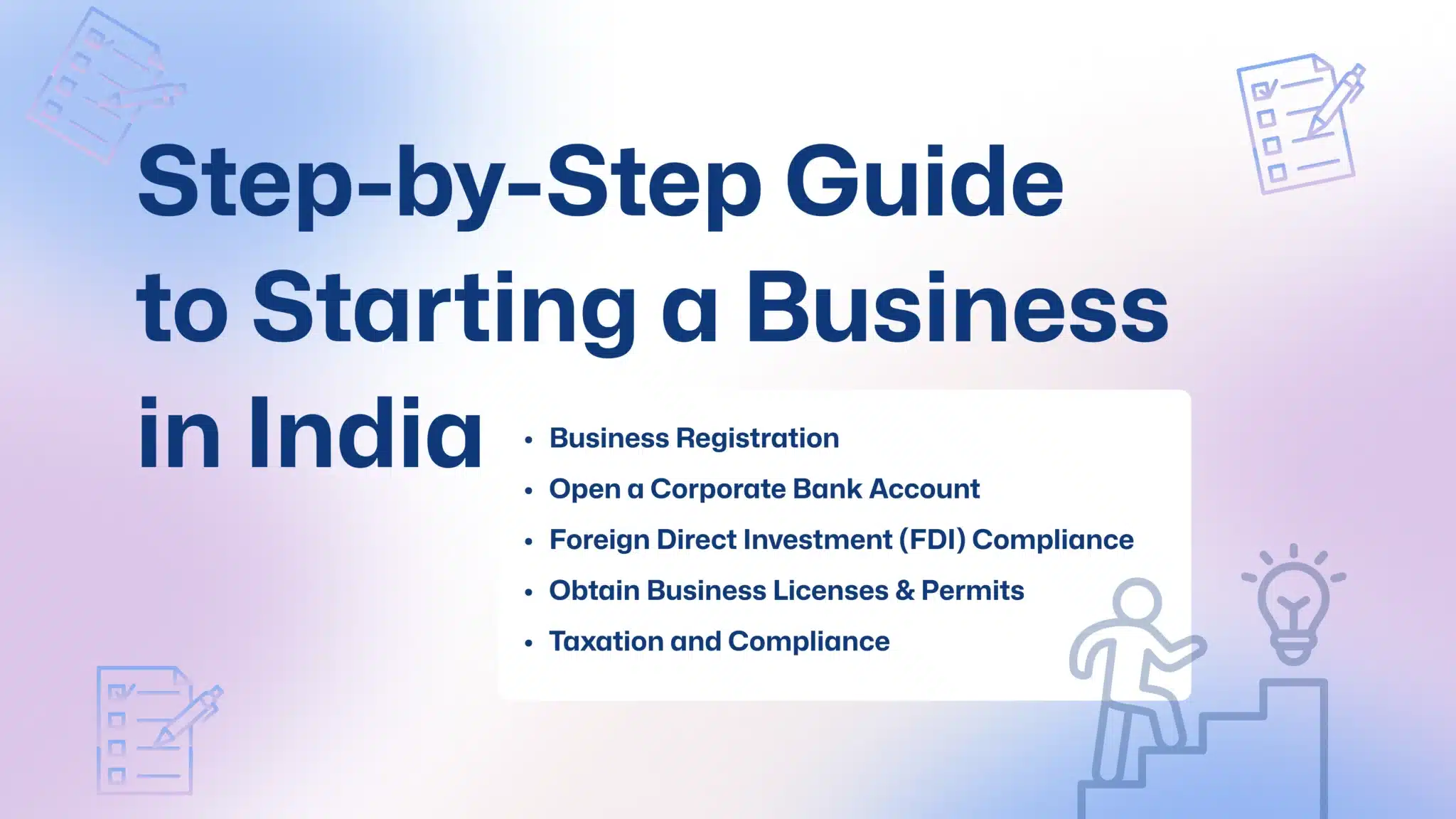India is one of the fastest-growing economies in the world. With more people using digital tools and strong support from the government, it has become a great place for new businesses. Many young entrepreneurs see India as a land full of opportunities.
The best business to start depends on simple factors—what people need, how much money you can invest, and how quickly that industry is growing. If you match your skills with market demand, you can build a business that grows fast and stays strong.
In this blog, we will explore:
- The most promising business sectors in India.
- The impact of e-business on entrepreneurship.
- Key factors to consider before starting a business.
- Step-by-step guidance on business Set up, legal compliance, and government support.
This guide will share easy tips to help entrepreneurs choose better and grow in India’s changing business world.
Why Choose India for Your Business?
India is one of the fastest-growing economies, offering vast opportunities for entrepreneurs. Here’s why launching a business setup in India can be a game-changer:
- Rapid Economic Growth – India’s economy is expanding at an impressive pace, with strong GDP growth and rising global influence.
- Growing Middle Class – More people in India now have extra money to spend, which is creating new chances for businesses in many industries.
- Entrepreneurial Support – The government runs programs like Startup India and Make in India. These give tax benefits, subsidies, and simple rules to help new businesses grow.
- Digital Growth – India’s online economy is growing fast. Fintech, AI, and e-commerce are rising quickly, giving tech businesses a good space to grow.
- Foreign Investment – The government has made FDI rules easier in many sectors. This makes India a strong choice for investors from around the world.
- Skilled Workforce – India has many young and skilled people. Every year, the country adds more engineers, business experts, and tech talent.
For anyone planning to start business in India, these factors create a strong foundation for success.
What is E-Business in India?
E-business in India has transformed traditional commerce through digital platforms. The Indian e-commerce industry is valued at $147.3 billion in 2024 and is expected to grow at a CAGR of 18.7% until 2028. This growth is fueled by:
- AI-Driven Customer Experiences – Personalized recommendations, chatbots, and automation.
- Digital Payment Systems – UPI, mobile wallets, and blockchain transactions.
- Government Digital Initiatives – Open Network for Digital Commerce (ONDC) and Digital India.
This makes e-business one of the easiest ways to start business in India with low barriers and high scalability.
Business Structures Available in India
Before starting a business, it is important to choose the right legal structure. Each option has its own benefits and limits for your business setup:
- Private Limited Company (Pvt Ltd) – The most widely used structure. In permitted sectors, it allows 100% foreign ownership, making it attractive for investors.
- Limited Liability Partnership (LLP) – A good choice for ventures with two or more partners. It offers limited liability while keeping operations flexible.
- Sole Proprietorship – Best suited for small businesses. It is simple to set up, but the owner takes full responsibility for all risks and debts.
- Franchise Business – Working with an established brand lowers risk and makes it easier to enter the market quickly.
Choosing the right structure is one of the most important steps when you start business in India.
Top Business Sectors to Consider
Information Technology (IT) and Artificial Intelligence (AI)
- India’s IT industry is valued at over $250 billion, making it a global leader.
- AI-driven applications in automation, healthcare, and cybersecurity are growing rapidly.
- The AI sector in India is expected to reach $17 billion by 2027.
Renewable Energy and Sustainability
- India is investing heavily in clean energy, including solar and wind projects.
- Government initiatives like the National Solar Mission support renewable energy startups.
- Businesses focused on energy storage, electric vehicle (EV) infrastructure, and recycling are promising.
Healthcare and Biotechnology
- The healthcare sector is expanding, with opportunities in telemedicine, medical devices, and biotech research.
- Digital health startups are gaining traction due to increasing internet penetration.
- Personalized medicine and affordable diagnostics are emerging business areas.
Financial Technology (FinTech)
- FinTech is booming with innovations in digital payments, lending platforms, and blockchain technology.
- Government support for financial inclusion enhances FinTech startup growth.
- The expansion of UPI-based transactions has transformed India’s financial landscape.
These are some of the best areas for entrepreneurs looking to start business in India today.
Step-by-Step Guide to Starting a Business in India

Step 1: Business Registration
Register your company through the Ministry of Corporate Affairs (MCA) portal.
- Obtain a Digital Signature Certificate (DSC) for e-filings.
- Apply for a Director Identification Number (DIN).
- Get company name approval via the MCA portal.
- Submit the SPICe+ form for incorporation.
- Receive your Corporate Identity Number (CIN) after approval.
Step 2: Open a Corporate Bank Account
A company must have a corporate bank account to carry out financial transactions. The common documents required include:
- Certificate of Incorporation
- Permanent Account Number (PAN)
- KYC details of the directors
Step 3: Foreign Direct Investment (FDI) Compliance
Businesses with foreign investment need to check if their sector comes under the automatic route (no approval needed) or the government route (approval required). If approval is necessary, the application has to be made through the Foreign Investment Facilitation Portal (FIFP).
Step 4: Obtain Business Licenses & Permits
- GST Registration – Compulsory once annual turnover crosses ₹20 lakh.
- Import-Export Code (IEC) – Mandatory for companies engaged in international trade.
- Sector-Specific Licenses – Required for industries such as healthcare, food, and financial services.
Step 5: Taxation and Compliance
- Corporate Tax – Between 15% and 30%, depending on turnover.
- GST (Goods and Services Tax) – Ranges from 5% to 28%, based on the sector.
- Withholding Tax (TDS) – Applicable on foreign remittances.
- Annual Compliance – Companies must file annual returns with the Registrar of Companies (ROC).
This step-by-step guide ensures a smooth business setup for anyone looking to start business in India.
Challenges and Solutions
High Competition
The Indian market is crowded, and many businesses compete in the same space.
Solution: Stand out by offering something unique and build a strong brand that connects with your customers.
Regulatory Complexity
Running a company means dealing with several laws and frequent policy changes.
Solution: Take guidance from legal experts and keep yourself updated on compliance to stay trouble-free.
Funding and Investment Hurdles
Getting funds is one of the toughest parts of starting up.
Solution: Explore multiple sources like venture capital, angel investors, crowdfunding, and government startup schemes to secure capital.
Government Support for Entrepreneurs
- Startup India – Offers tax exemptions, funding support, and mentorship programs.
- Make in India – Encourages manufacturing businesses with incentives.
- Atal Innovation Mission (AIM) – Provides grants for innovation-driven startups.
Final Thoughts
Starting a business in India offers immense potential, particularly in IT, renewable energy, healthcare, and FinTech. With the right legal structure, thorough market research, and government support, entrepreneurs can navigate the regulatory landscape and establish successful ventures. The digital revolution and e-business in India are paving the way for innovative and scalable businesses. By leveraging technology, maintaining compliance, and exploring funding opportunities, entrepreneurs can build sustainable enterprises in one of the world’s most dynamic economies.
Need help with business setup in India?
Book a consultation with our FinGuru experts today!
Call: +91-9999927022
Visit: www.Finguruindia.com




